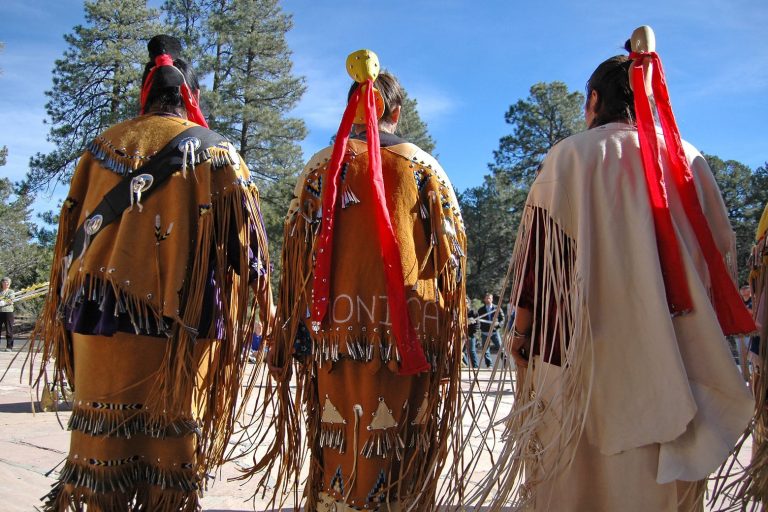“Religious freedom” is in the spotlight in federal courts. One of the great goals of the conservative legal movement was to advance religious freedom in ways that it could never have achieved before. However, while the courts have certainly brought significant victories to Christian legal interests in recent years, now that the conservative takeover of the federal judiciary movement judges The left’s fears about religious favoritism in the justice system appear to have been confirmed. As the U.S. Court of Appeals for the Ninth Circuit demonstrated in an opinion issued earlier this month in Apache Stronghold v. United Statesfor religious practitioners outside the “Judeo-Christian” tradition, religious freedoms may actually be more restricted than they were under previous legal regimes.
Apache Stronghold, the nonprofit organization suing to prevent the sale of federal land in Arizona, argued that the sale and development of sacred Apache lands violated provisions of the First Amendment. free exercise clause and the Religious Freedom Restoration Act. Designed to strengthen protections for religious freedom and exercise, RFRA imposes a strict standard of review on any federal law or other action that “substantially burdens” the exercise of religion, meaning the government must demonstrate that its action supports a “compelling governmental interest”. » and that his action was the least restrictive means of supporting this interest.
Some Apache religious practices are linked to certain sacred sites in original Apache territory, such as Oak Flat, a place that “embodies the spirit of the Creator.” In order to practice their spiritual traditions, Apaches must have access to these federal lands, and these lands must remain in their current natural state. According to Apache Stronghold, copper mining at Oak Flat will “forever close a portal to the Creator.” However, according to the Ninth Circuit, the sale of sacred Apache lands to copper mining interests for private exploitation “does not impose a substantial burden on religious exercise.”
On its face, this is an absurd argument that only makes sense if you don’t take Apache Stronghold’s religious claims seriously. When a spiritual practice is tied to specific land and that land is owned by the federal government, it is reasonable to expect the government to protect it to ensure continued access to sacred places. What’s even worse is that the conservative United States Supreme Court has used similar free exercise and RFRA arguments to protect conservative Christians from mere exposure or discomfort with modern principles of inclusion, even as courts continue to treat other religions as exceptions entitled to only minimal protections. .
Since the installation of the current conservative supermajority on the United States Supreme Court, the RFRA has been used repeatedly to promote Christian and conservative interests. In Fulton v. City of Philadelphia, the Supreme Court ruled that Philadelphia’s nondiscrimination policies violated RFRA by preventing a Catholic adoption agency from entering into a contract with the city because it refused to place children with LGBTQ+ families. The court also used the Free Exercise Clause and RFRA to invalidate employers’ mandate to provide contraceptive coverage in Little Sisters of the Poor c. Pennsylvania. The Ninth Circuit itself relied on the Free Exercise Clause to overturn a public school’s decision not to recognize a Christian student group that required students to have Christian beliefs to participate. Community of Christian Athletes v. San Jose Unified School District.
However, even as Christians rack up RFRA and free exercise victories in federal courts, followers of other religions – and indigenous religions in particular – have not been so lucky. Apache Stronghold is just the latest in a series of failures by the courts to prevent the desecration of sacred Indigenous sites and remains. In Big Sandy Rancheria of the Western Mono Indians v. Brownstone, the Ninth Circuit rejected the Big Sandy Rancheria of the Western Mono Indians’ claim that a California law allowing the removal of Native remains for scientific study without the tribe’s consent violated their religious freedom. The Ninth Circuit also held Navajo Nation v. United States Forest Service that spraying recycled wastewater at Navajo sacred sites did not pose a substantial burden on their religious practice involving those sites.
The difference in treatment between Christian and Native traditions is particularly shocking because the RFRA was first passed in response to a Supreme Court case regarding Native religious rights. In Employment Division v. Smith, the Supreme Court upheld the firing of two Native American employees who were denied unemployment benefits after using peyote, a sacrament, during their religious ceremonies. This ruling, which held that generally applicable laws could be applied to religious practices without violating the Free Exercise Clause of the First Amendment, caused widespread concern on the erosion of religious freedoms, particularly for minority and marginalized communities. In response, Congress passed RFRA with bipartisan support. Despite its beginnings as a shield intended to recognize the challenges facing indigenous religious practices in the courts, the RFRA has done little to protect indigenous rights and has instead become a sword for fundamentalist Christians to impose their points of view to the rest of society.
Recent developments in religious freedom cases in federal courts underscore a troubling reality of disparate outcomes based on religious affiliation. As the conservative legal movement seeks to strengthen religious freedom protections for all, recent decisions suggest pronounced favoritism toward Christian interests. Apache Stronghold is not necessarily lost to the tribe, however. There is still the possibility of review by the Supreme Court, and if the court were to remain true to its stated belief in a renewed RFRA, it should take Apache Stronghold’s claims seriously. Given the Court’s recent history and the federal courts’ general disregard for Native religious claims, it seems unlikely that even a violation of religious rights as egregious as that in this case would garner sympathy among Native people. judges.


